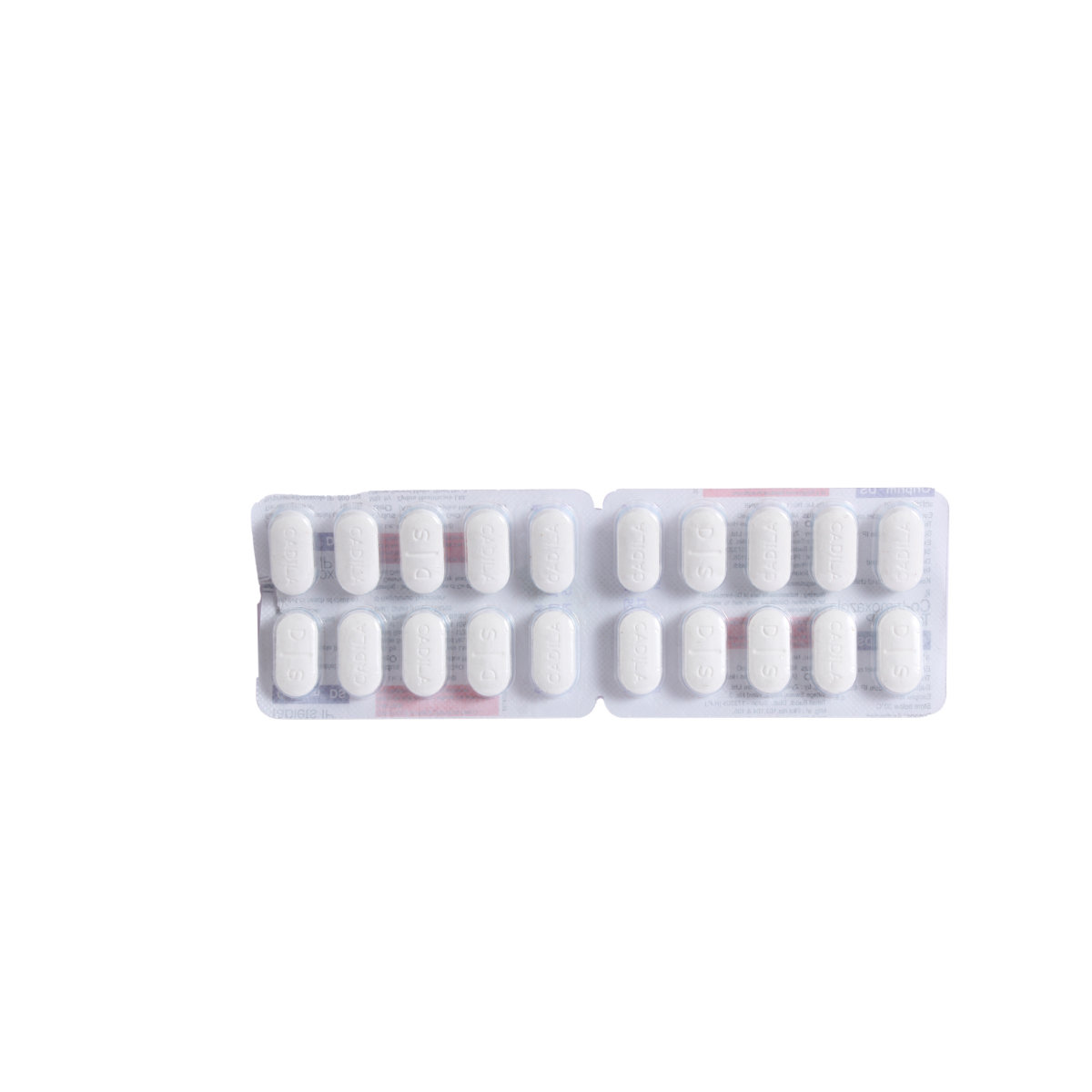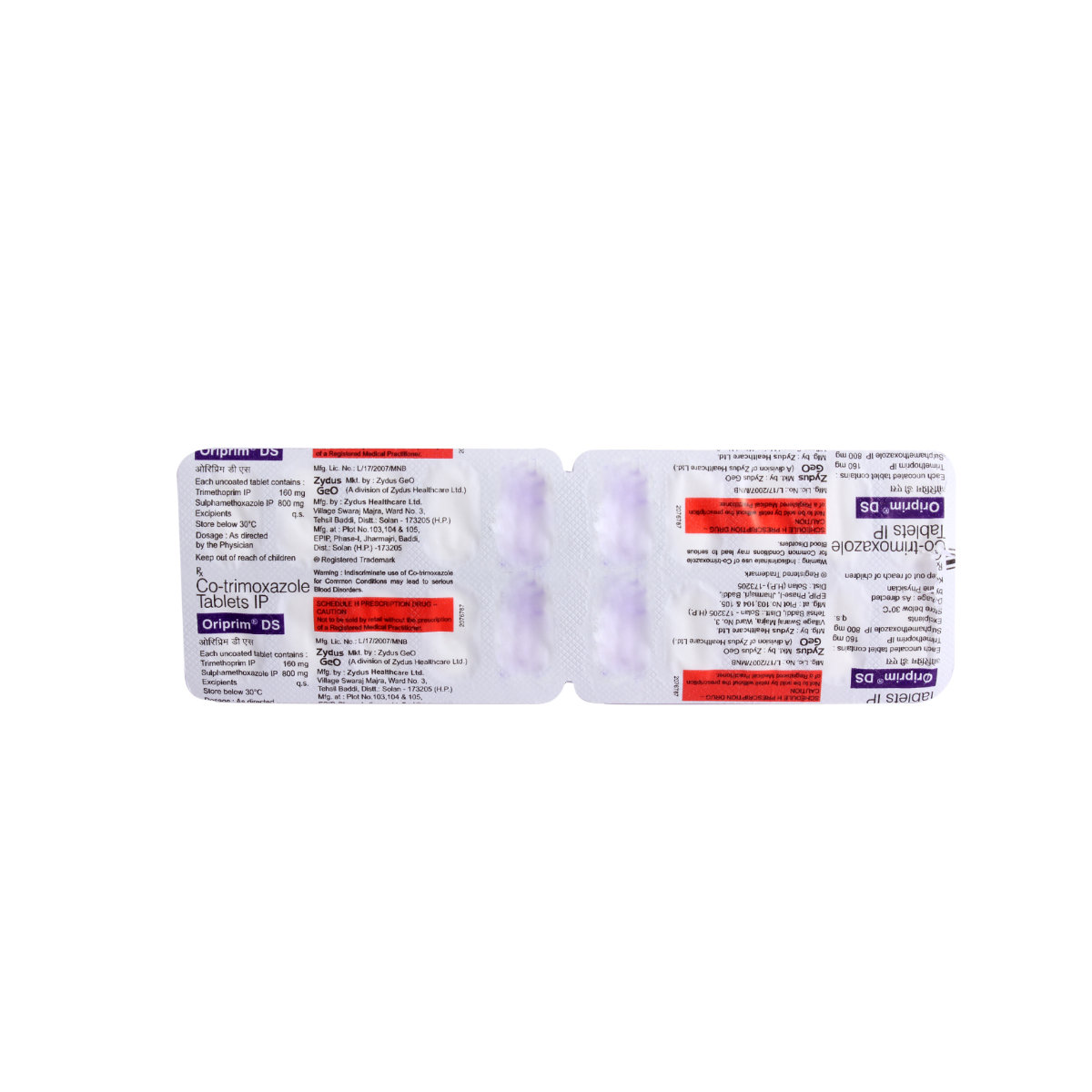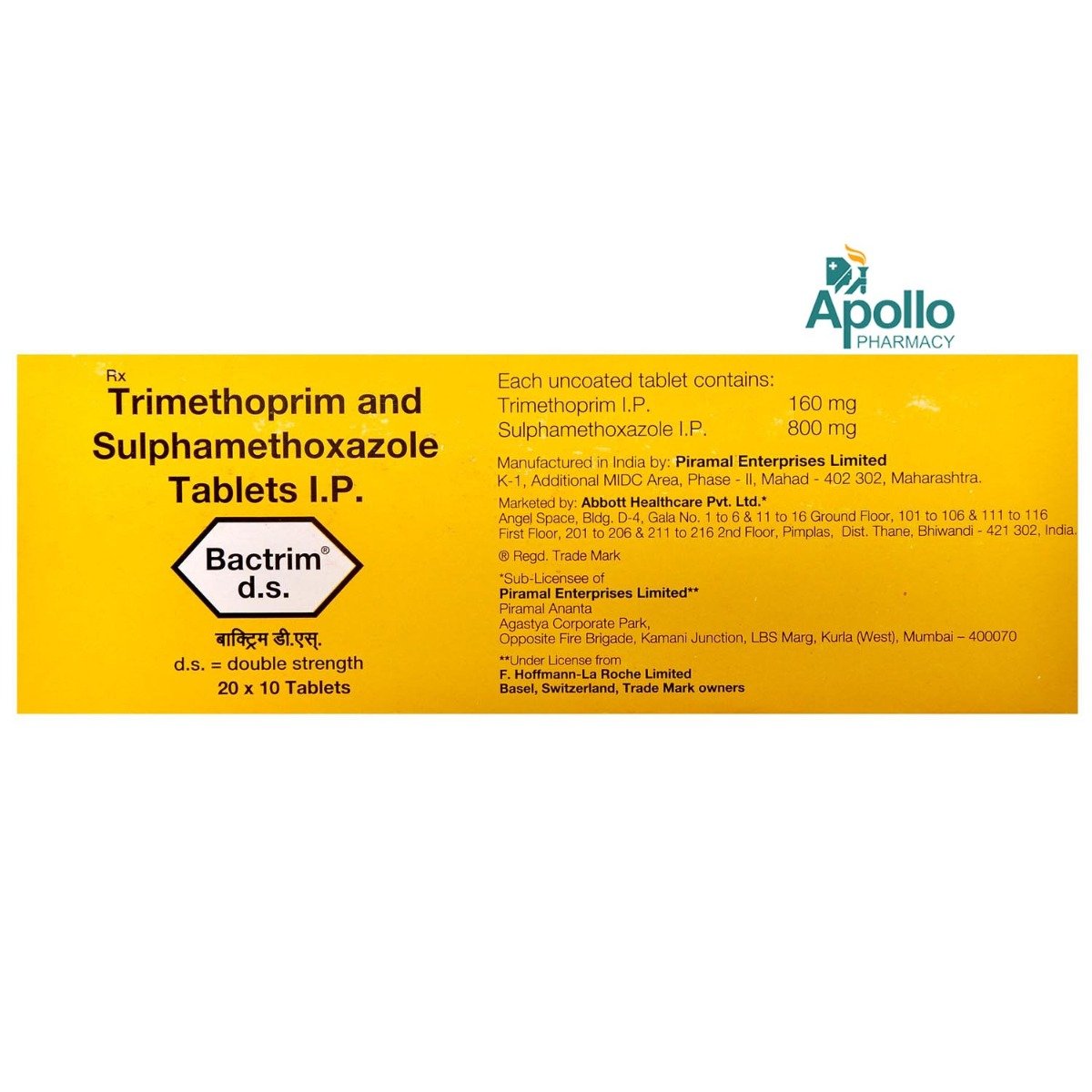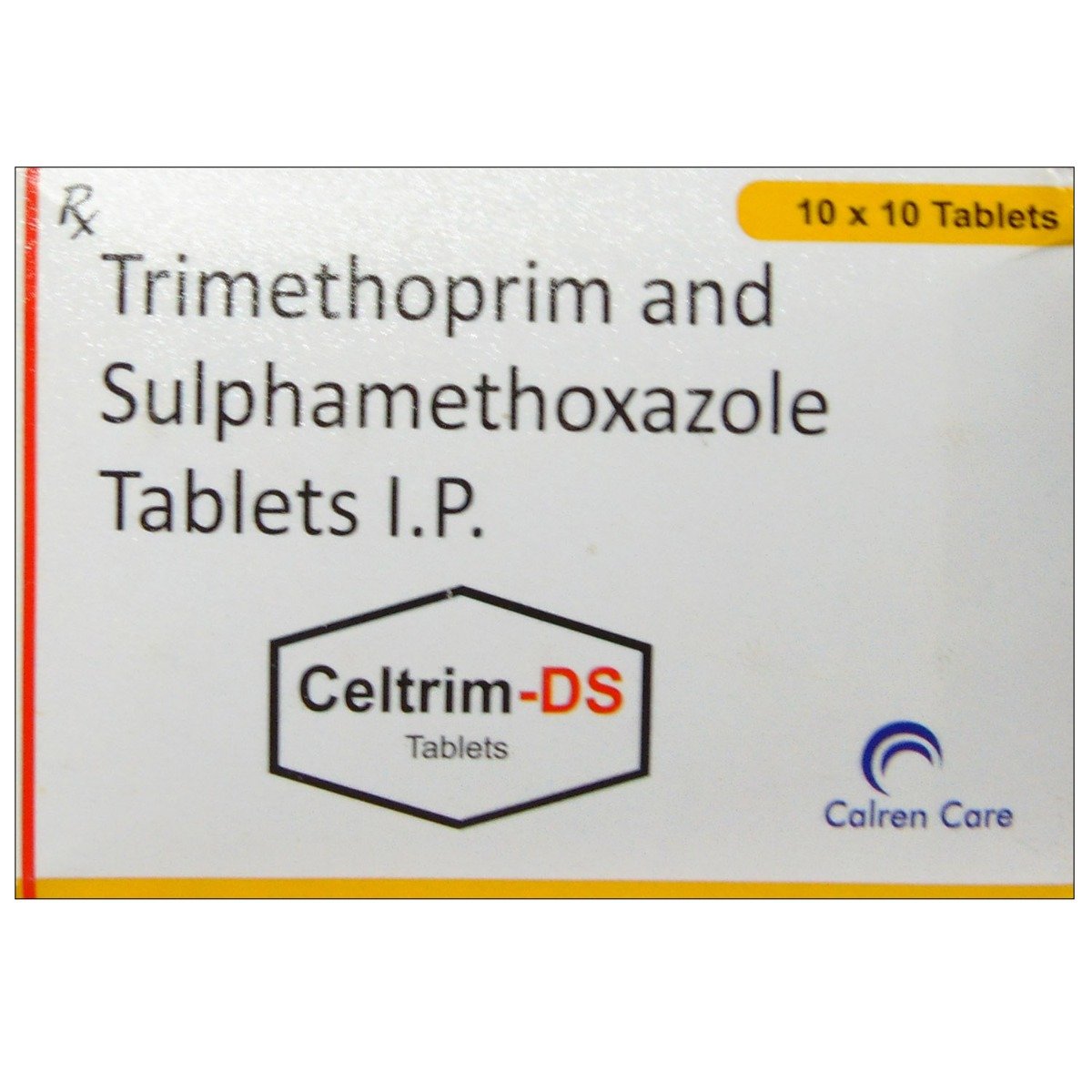Oriprim Ds Tablet 10's
MRP ₹24
(Inclusive of all Taxes)
₹3.6 Cashback (15%)
Provide Delivery Location
Online payment accepted
 Prescription drug
Prescription drugWhats That
Composition :
Manufacturer/Marketer :
Consume Type :
Expires on or after :
Return Policy :
About Oriprim Ds Tablet
Oriprim Ds Tablet belongs to the group of medicines called ‘antibiotics’ used to treat bacterial infections of the urinary tract, respiratory tract (bronchitis), ear (otitis media), lungs (pneumonia), skin, brain and toxoplasmosis (infection caused by a bacteria called toxoplasma). Bacterial infections are caused due to the multiplication of harmful bacteria inside or on the body. Oriprim Ds Tablet does not work against infections caused by the virus, including cold and flu.
Oriprim Ds Tablet is a combination of two antibiotics, namely: Trimethoprim (folic acid inhibitors) and Sulfamethoxazole (sulfonamides). Trimethoprim prevents the formation of tetrahydrofolic acid, and sulfamethoxazole stops the bacteria from making dihydrofolic acid. Tetrahydrofolic acid and dihydrofolic acid are essential for the formation of proteins and nucleic acids, which are necessary for the survival of the bacteria. By inhibiting these, Oriprim Ds Tablet stops the growth of bacteria and kills them. Thereby, it helps to treat bacterial infections.
Your doctor will decide the dose and duration of Oriprim Ds Tablet based on your condition and the severity of the infection. In some cases, you may experience certain common side-effects such as high levels of potassium in the blood, palpitations (abnormal heartbeats), thrush or candidiasis (fungal infection), headache, nausea, diarrhoea, and skin rashes. Most of these side-effects do not require medical attention and resolve gradually over time. However, you are advised to talk to your doctor if you experience these side-effects persistently.
Before starting Oriprim Ds Tablet , please inform your doctor if you have any allergy (against any antibiotic), kidney or liver problems. Do not take Oriprim Ds Tablet on your own as self-medication may lead to antibiotic-resistance in which antibiotics fail to act against specific bacterial infections. Consult your doctor before taking Oriprim Ds Tablet if you are pregnant or breastfeeding. Avoid alcohol consumption to prevent unpleasant side-effects such as fast heartbeats, warmth or redness under your skin, tingly feeling, nausea, and vomiting. Oriprim Ds Tablet is not recommended for children below 12years.
Uses of Oriprim Ds Tablet
Directions for Use
Key Benefits
Oriprim Ds Tablet belongs to the group of medicines called ‘antibiotics’ used to treat various bacterial infections of the urinary tract, respiratory tract (bronchitis), ear (otitis media), lungs (pneumonia), skin, brain and toxoplasmosis (infection caused by a bacteria called toxoplasma). Oriprim Ds Tablet is a combination of two antibiotics, namely: Trimethoprim (folic acid inhibitors) and Sulfamethoxazole (sulfonamides). Trimethoprim prevents the formation of tetrahydrofolic acid, and sulfamethoxazole stops the bacteria from making dihydrofolic acid. Tetrahydrofolic acid and dihydrofolic acid are essential for the formation of proteins and nucleic acids, which are necessary for the survival of the bacteria. By inhibiting these, Oriprim Ds Tablet kills the bacteria and stops their growth. Thereby, it helps to treat bacterial infections. Oriprim Ds Tablet is a broad-spectrum antibiotic which is active against a wide range of gram-positive and gram-negative bacteria such as Streptococcus pneumonia, Escherichia coli, Klebsiella species, Enterobacter species, Haemophilus influenzae, etc.
Storage
- Avoid trigger foods that can cause allergic reactions, such as nuts, shellfish, or dairy products.
- Keep a food diary to track potential food allergens.
- Include omega-3 rich foods like salmon and walnuts to reduce inflammation.
- Wear loose, comfortable clothing made from soft fabrics like cotton.
- Apply cool compresses or take cool baths to reduce itching.
- Use gentle soaps and avoid harsh skin products.
- Reduce stress through relaxation techniques like meditation or deep breathing.
- Skin rash caused by allergies is due to irritants or allergens. Therefore, avoid contact with such irritants.
- Consult your doctor for proper medication and apply an anti-itch medication. Follow the schedule and use the medication whenever needed.
- Protect your skin from extreme heat and try to apply wet compresses.
- Soak in the cool bath, which gives a soothing impact to the affected area.
- Preventing Vomiting (Before it Happens)
- Take medication exactly as prescribed by your doctor. This can help minimize side effects, including vomiting.
- Having a small meal before taking your medication can help reduce nausea and vomiting.
- Talk to your doctor about taking anti-nausea medication along with your prescribed medication.
- Managing Vomiting (If it Happens)
- Try taking ginger in the form of tea, ale, or candy to help alleviate nausea and vomiting.
- What to Do if Vomiting Persists
- Consult your doctor if vomiting continues or worsens, consult the doctor for guidance on adjusting your medication or additional treatment.
- Inform your doctor about the nausea and discuss possible alternatives to the medication or adjustments to the dosage.
- Divide your daily food intake into smaller, more frequent meals to reduce nausea.
- Opt for bland, easily digestible foods like crackers, toast, plain rice, bananas, and applesauce.
- Avoid certain foods that can trigger nausea, such as fatty, greasy, spicy, and smelly foods.
- Drink plenty of fluids, such as water, clear broth, or electrolyte-rich beverages like coconut water or sports drinks.
- Use ginger (tea, ale, or candies) to help relieve nausea.
- Get adequate rest and also avoid strenuous activities that can worsen nausea.
- Talk to your doctor about taking anti-nausea medication if your nausea is severe.
- Record when your nausea occurs, what triggers it, and what provides relief to help you identify patterns and manage your symptoms more effectively.
- Hydrate your body: Drink enough water to prevent dehydration and headaches.
- Calm Your Mind: Deep breathing and meditation can help you relax and relieve stress.
- Rest and Recharge: Sleep for 7-8 hours to reduce headache triggers.
- Take rest: lie down in a quiet, dark environment.
- Cold or warm compresses can help reduce tension.
- Stay Upright: Maintain good posture to keep symptoms from getting worse.
- To treat headaches naturally, try acupuncture or massage therapy.
- Over-the-counter pain relievers include acetaminophen and ibuprofen.
- Prescription Assistance: Speak with your doctor about more substantial drug alternatives.
- Severe Headaches: Seek emergency medical assistance for sudden, severe headaches.
- Frequent Headaches: If you get reoccurring headaches, consult your doctor.
- Headaches with Symptoms: Seek medical attention if your headaches include fever, disorientation, or weakness.
Drug Warnings
Do not take Oriprim Ds Tablet if you are allergic to any of its contents; if you have severe liver or kidney problems, thrombocytopenia (low levels of platelets in the blood), or porphyria (rare blood problem). Consult your doctor immediately if you experience skin rash or prolonged, significant diarrhoea with abdominal pain. Talk to your doctor before taking Oriprim Ds Tablet if you have severe allergies, asthma, ulcers, blood disorders, thyroid dysfunction, diabetes, are elderly, underweight or malnourished; if you have a folic acid deficiency, glucose-6-phosphate dehydrogenase deficiency, or high levels of potassium in the blood. Consult your doctor if you are pregnant or breastfeeding. Avoid alcohol consumption while taking Oriprim Ds Tablet to prevent unpleasant side-effects such as fast heartbeats, warmth or redness under your skin, tingly feeling, nausea, and vomiting.
Drug-Drug Interactions
Drug-Drug Interactions
Login/Sign Up
Taking Oriprim Ds Tablet with BCG vaccine can reduce the effectiveness of the BCG vaccine
How to manage the interaction:
Although there is an interaction between Oriprim Ds Tablet and BCG vaccine is not recommended, they can be taken together if prescribed by a doctor. Do not discontinue any medications without consulting a doctor.
Taking Oriprim Ds Tablet with Levobupivacaine may cause methemoglobinemia (blood disorder in which too little oxygen is delivered to your cells).
How to manage the interaction:
Although there is a possible interaction between Levobupivacaine and Oriprim Ds Tablet, you can take these medicines together if prescribed by your doctor. However, if you experience nausea, headache, dizziness, fatigue, or difficulty breathing, it's best to contact your doctor right away. Do not stop using any medications without talking to your doctor.
Taking Oriprim Ds Tablet with telmisartan may increase potassium levels in the blood.
How to manage the interaction:
Although there is an interaction between telmisartan and Oriprim Ds Tablet, they can be taken together if prescribed by a doctor. However, consult a doctor if you experience nausea, vomiting, weakness, confusion, tingling of the hands and feet, feelings of heaviness in the legs, and a weak pulse. Do not discontinue the medications without consulting a doctor.
Taking Irbesartan with Oriprim Ds Tablet may increase potassium levels in the blood and kidney problems.
How to manage the interaction:
Although taking Irbesartan with Oriprim Ds Tablet together can possibly result in an interaction, it can be taken if a doctor has prescribed it. However, consult your doctor if you experience nausea, vomiting, weakness, disorientation, tingling in your hands and feet, feelings of heaviness in your legs, or a slow or irregular heartbeat. Do not discontinue any medications without a doctor's advice.
Taking olmesartan medoxomil with Oriprim Ds Tablet may increase potassium levels in the blood.
How to manage the interaction:
Although taking olmesartan medoxomil with Oriprim Ds Tablet may lead to an interaction but can be taken if prescribed by the doctor. However, consult the doctor if you experience nausea, vomiting, weakness, disorientation, tingling in your hands and feet, feelings of heaviness in your legs, a weak pulse, or a slow or irregular heartbeat. Do not stop using any medications without talking to a doctor.
Oriprim Ds Tablet may decrease the blood levels and effects of folic acid.
How to manage the interaction:
Although there is a possible interaction between Folic acid and Oriprim Ds Tablet, you can take these medicines together if prescribed by your doctor. Do not stop using any medications without consulting your doctor.
Taking captopril with Oriprim Ds Tablet may increase the risk of hyperkalemia (high level of potassium in the blood) and kidney problems.
How to manage the interaction:
Although there is a interaction between Oriprim Ds Tablet and captopril, they can be taken together if prescribed by a doctor. Do not discontinue any medications without consulting a doctor.
When amiloride is taken with Oriprim Ds Tablet it may raise potassium levels in the blood. (High potassium levels can cause hyperkalemia, which can lead to kidney failure, muscular paralysis, abnormal heart rhythm).
How to manage the interaction:
Although there is an interaction between amiloride and Oriprim Ds Tablet, they can be taken together if prescribed by a doctor. However, consult a doctor if you experience nausea, vomiting, weakness, tingling in your hands and feet, feelings of heaviness in your legs, a weak pulse. Do not discontinue any medications without consulting a doctor.
Enalapril combined with Oriprim Ds Tablet can cause hyperkalemia by elevating blood potassium levels. In severe cases, hyperkalemia can induce muscle paralysis, renal damage, and cardiac problems. The risk is increased if you are elderly, dehydrated, or have a history of renal or cardiovascular disease.
How to manage the interaction:
Although taking Enalapril together with Oriprim Ds Tablet may possibly result in an interaction, they can be taken together if prescribed by your doctor. However, contact your doctor immediately if you experience signs and symptoms of hyperkalemia, such as nausea, vomiting, confusion, numbness, tingling in hands and feet, and irregular heartbeat. It is advised to limit the intake of potassium-rich foods like tomatoes, bananas, mangoes, beans, and potassium-containing supplements. Do not discontinue any medication without consulting your doctor.
Taking potassium gluconate with Oriprim Ds Tablet can increase the risk of high potassium levels in the blood.
How to manage the interaction:
Although there is a possible interaction between Oriprim Ds Tablet and Potassium gluconate, you can take these medicines together if prescribed by your doctor. However, if you are feeling sick, feeling weak, confused, or having a weak or irregular heartbeat contact your doctor immediately. Do not stop using any medications without talking to your doctor.
Drug-Food Interactions
Drug-Food Interactions
Login/Sign Up
Diet & Lifestyle Advise
- Antibiotics can alter the useful bacteria in the stomach, which help in digestion. Therefore, you are advised to take foods rich in probiotics such as yoghurt/curd, kefir, sauerkraut, tempeh, kimchi, miso, kombucha, buttermilk, natto and cheese.
- Eat fibre rich food like whole grains, beans, lentils, berries, broccoli, peas and bananas.
- Avoid foods rich in calcium, grapefruit and grapefruit juice as they might hinder the absorption of antibiotics.
- Avoid consumption of alcohol and usage of tobacco.
Side Effects of Oriprim Ds Tablet
- High levels of potassium in the blood
- Palpitations (abnormal heartbeats)
- Thrush or candidiasis (fungal infection)
- Headache
- Nausea
- Diarrhoea
- Skin rashes
Habit Forming
Therapeutic Class
All Substitutes & Brand Comparisons
RX
Out of StockBactostab DS Tablet
₹11
(₹0.99 per unit)
54% CHEAPERRX
Out of StockEltiprim DS 800mg/160mg Tablet
₹11.36
(₹1.02 per unit)
52% CHEAPERRX
Out of StockEstrim 800mg/160mg Tablet
₹11.42
(₹1.03 per unit)
52% CHEAPER
Author Details
We provide you with authentic, trustworthy and relevant information
Drug-Diseases Interactions
Drug-Diseases Interactions
Login/Sign Up
FAQs
Drug-Drug Interactions Checker List
- GLIBENCLAMIDE
- AZITHROMYCIN
- METRONIDAZOLE
- ALBUTEROL
- BENDROFLUMETHIAZIDE
- GLICLAZIDE
Special Advise
- Oriprim Ds Tablet may affect certain laboratory test results such as blood tests. Inform the person doing the tests that you are taking Oriprim Ds Tablet .
- Your doctor may advise you to get regular tests if you have kidney problems or if you have been prescribed Oriprim Ds Tablet for a longer duration, to know if the medicine is working properly.
Disease/Condition Glossary
Bacterial infections: A bacterial infection is a condition in which harmful bacteria enter, multiply, and infect the body. Infectious or harmful bacteria can make you sick and reproduce quickly in the body. These harmful bacteria produce chemicals known as toxins, which can damage tissue and make you sick. Symptoms include fever, chills, and fatigue. Anyone can become infected with a bacterial infection. But, people with a weak immune system or taking immunosuppressive medicine are more prone to bacterial infection.

Have a query?
Alcohol
Safe if prescribed
Avoid alcohol consumption while taking Oriprim Ds Tablet to prevent unpleasant side-effects such as fast heartbeats, warmth or redness under your skin, tingly feeling, nausea, and vomiting.
Pregnancy
Consult your doctor
Please consult your doctor before taking Oriprim Ds Tablet if you are pregnant. Your doctor will prescribe Oriprim Ds Tablet only if the benefits outweigh the risks.
Breast Feeding
Consult your doctor
Please consult your doctor if you are breastfeeding, your doctor will prescribe Oriprim Ds Tablet only if the benefits outweigh the risks.
Driving
Safe if prescribed
It is unknown whether Oriprim Ds Tablet affects your ability to drive and operating machinery. Drive only if you are physically stable and mentally focussed.
Liver
Consult your doctor
Please consult your doctor before taking Oriprim Ds Tablet if you have liver impairment/liver disease. Your doctor will weigh the benefits and any potential risks before prescribing it to you.
Kidney
Consult your doctor
Oriprim Ds Tablet to be taken with caution, especially if you have a history of kidney impairment/kidney disease. The dose may have to be adjusted by your doctor.
Children
Safe if prescribed
Oriprim Ds Tablet is not recommended for children below 12 years.












_0.jpg?tr=q-85)

